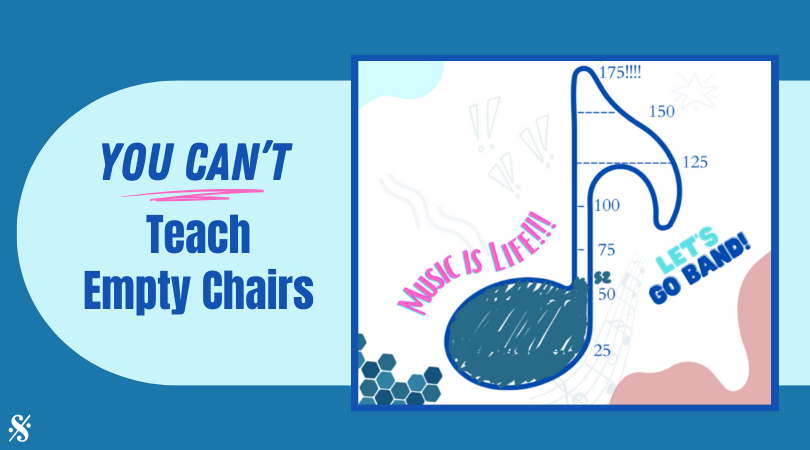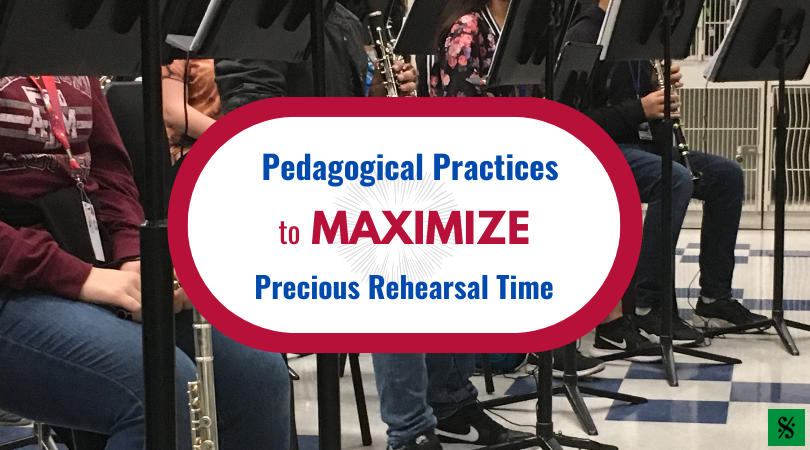
Dear Future Music Educators,
First of all, thank you for thinking of this amazing profession as a way to spend your life. I say spend because, hey, we are only given so many days here, and it is a good thing when we do something important with them. You are standing on the edge of a lifetime of learning, thinking, writing, studying, struggle, fatigue, helplessness, joy, fun, laughter, fear, self-doubt, anger, friendship, mentorship, listening, speaking, shouting, whispering, whining, and wondering.
Get ready.
This work is wonderful, challenging, and difficult. It is not for the faint of heart. You will need to be brave. You may face classes that don’t care, an administration that doesn’t understand, and communities that do not support you. You may be asked to do the impossible, accomplish the improbable, all with equipment, time, and resources that are unacceptable and at least forty years older than they should be. You will need to be brave and tireless. Your constitution will need to hold up against many questions of why, how, and how much? You will need to know the answers to questions you don’t learn about in school, and you will need to face all of this with a strong sense of mission and vision.
You will have to be patient. You will be faced with a world that is just not fair. It will never be fair, and you will have to get used to that or leave. You will work more than you are paid for, you will work harder than those who are paid more. Everyone else on your staff will know your parking spot because your car is there when they arrive and when they leave. You will struggle to finish those masters courses because you are planning a trip for seventy-five students, or you are collecting poinsettia fundraiser forms, or you are doing an extra pit band rehearsal before the show, or you are helping the flute ensemble with their project or…
You will have to be a great improviser. You will learn to fix clarinets, xylophones, and tubas. You will get tremendously excited when you are on the music publisher websites, and oh boy, will you dream! You will imagine concerts and events that will teach so much and bring the house down. You will adjust all of those plans around an alto section that used to have six voices but now has three. You will know more than you ever wanted to know about spit valves (water key, water key, water key).
You will need to be a producer. You will become masters of setting up, taking down, and setting up again—stands, chairs, acoustic shells, percussion sections, keyboard stands, audience seating, speaker stands, rhythmic stick stations, and fundraising booths. You will know exactly what plug in the gym to avoid so as not to blow the power for half the building with a bass amp, and you will always, always know where the first aid kit is.
You will wonder if you are selling cars. You will know the name of every politician in your district. You will listen carefully to the stories that start, “In my day I played the baritone horn…” if it means another cookie dough sale. You will, with hope in your heart, write news releases to local papers to advertise concerts; you will hound news media to cover your events and your class activities. You will wrack your brain to try to find one more chaperone, one more concert room supervisor, and one more parent to guard the lower door so nobody but the students get backstage.
You will need to be flexible. You will do one thousand jobs that you never trained for, and you will do one thousand more that you did not know existed. On top of this, if your schedule is not full, you may teach math, English, yoga, or health. You will do duty—so much duty. (I often called it score study to make myself feel better.) You will supervise dances, proms, and school events. At graduation, you will learn to zone out as the band plays Pomp and Circumstance for the twenty-seventh time.
Now…
If all of this sounds too difficult, STOP NOW. STOP READING. Enroll in law, or medicine, or forestry. You are smart and capable and good. That is why you are musicians, and music is why you are they way you are. However, if you are getting into this for any other reason than because you love, and I mean LOVE music and want to share it with anyone, at any time, in any way possible—then quit. Now. Seriously, life is too short.
OK?
You didn’t stop. Awesome! Good for you.
What you also need to know is that, amidst all of the difficulties, you will be doing some of the most important work that can be done. You will make a difference. You will change the world through sound, and how many people actually get to say that? You will be powerful, impactful, and important to students who are not even born yet, and you will leave a legacy. You will leave a legacy of musicians who want to share music with the people they will meet during their lifetime. How about that?
It is hard work. It is hours and hours of meticulous chasing of unattainable perfection. But that work is done with powerful colleagues, inspiring mentors, and absolutely wonderful youths. Your students will inspire you every day with their desire to learn, to get better, and to be amazing. Somewhere in your class is the teacher of the next generation of music students. Somewhere in there is a rock star, a professional musician, a producer, a Broadway star, and a lifetime community band member. They all want to be as good as they can, and you will help them. Most importantly, you will create memories of success that will help them build to other accomplishments, and help students know what success means.
This is demanding work. It is not for the faint of heart. You need a suit of armor that you put on every day, and your suit of armor needs to let through the most important weapons: compassion, belief, caring, and creativity. You need to be brave. You need to face the world and say, “This is valuable because it is beautiful, and the world needs this beauty.”
So, my friends, go forth with passion. Go forth to a world made better by your work, and a life well-lived.
You are important.
Make a difference.
Welcome to the profession.
Nathan Beeler is a music educator, conductor, and performer in Halifax, Nova Scotia, Canada. He is the Department Head of Halifax Regional Arts Music (West) and conducts the Senior Orchestra and Wind Ensemble. Nathan is the recipient of the Prime Minister’s Award for Teaching Excellence, one of Canada’s highest awards for teachers.
Related Reading:
Starting a New Job: Ways to a Successful Start
9 Tips to Surviving as a First Year Band Director
I Finally Have My Own Band…Now What?!?!?!
If you would like to receive our weekly newsletter, sign up here.
Don’t forget to like us on Facebook too!
Learn. Share. Inspire.
BandDirectorsTalkShop.com






Leave a Reply
You must be logged in to post a comment.